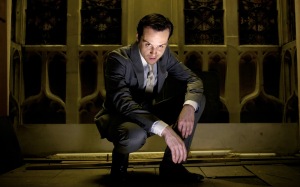Yesterday’s Sherlock episode was an absolute thriller. I sat on the edge of my seat with my neck craned out for most of the hour and a half. Cinematographer Steve Lawes has worked extremely hard to tell a story through every single shot and in doing so, he has made most other TV productions look like low budget, ill thought through A level projects. He is a truly a master of his trade and it is a wonder to behold.
But one thing left me thinking once the credits rolled. And no, it wasn’t ‘how is Morairty still alive’. It was why on earth does Sherlock almost end up in the same place as Moriarty when he gets shot? Steve Lawes navigates us seemlessly through Sherlock’s intricate mind palace right after he gets shot, until Sherlock knows that his only hope is to focus on a comforting thought to prevent himself from going into shock and dying– he remembers his dog redbeard. But he realises that he is losing consciousness anyway and groans ‘ they’re putting me down too’ before slumping to the ground. He then starts convulsing and Watson tries in vain to wake him up back in the apartment. And instead of walking through a dark tunnel towards a bright light, Sherlock in his unconscious state, hurtles down a bright, floodlit staircase into a warmly lit, padded cell. The only darkness in this scene is Sherlock himself, shrouded in his black overcoat.
And who should be in the cell but Jim Morairty, wrapped in a dirty white straight jacket, handcuffs and a neck chain tied to the wall. This is Sherlock’s hell, inside his own mind palace. And he thinks that in death, he will end up in the same place as his archenemy. How awful and terrifying! To think that Sherlock’s life on earth will ultimately lead him to the same dank dungeon that a serial killer inhabits. Have his endeavors to solve the toughest crimes led to no plush heaven, no comfy sofa in the sky, no rest from evil?
I think in our society, death hangs behind us like a shadow. We dare not turn around for fear of acknowledging its existence. And we dare not speak of it incase our words convince us of its inescapability. So we run on blindly, scrabbling for anything that might cut the shadow away. Utlimately, though we refuse to speak of death’s attachment to life, we cannot run hard or far or long enough to escape it. Sherlock’s mind palace image of Morairty was a man who had embraced death and it had led him to a padded cell and chains. Death is the one great inevitable. Its just a shame that Sherlock thinks hell is inevitable too. A gracious God ready to accept all who turn to him for forgiveness is an idea not compatible with Sherlock’s self-sufficiency and pride. I wonder where the similarities lie in our own society, and whether there is any room left for the hope of heaven in our hearts.
